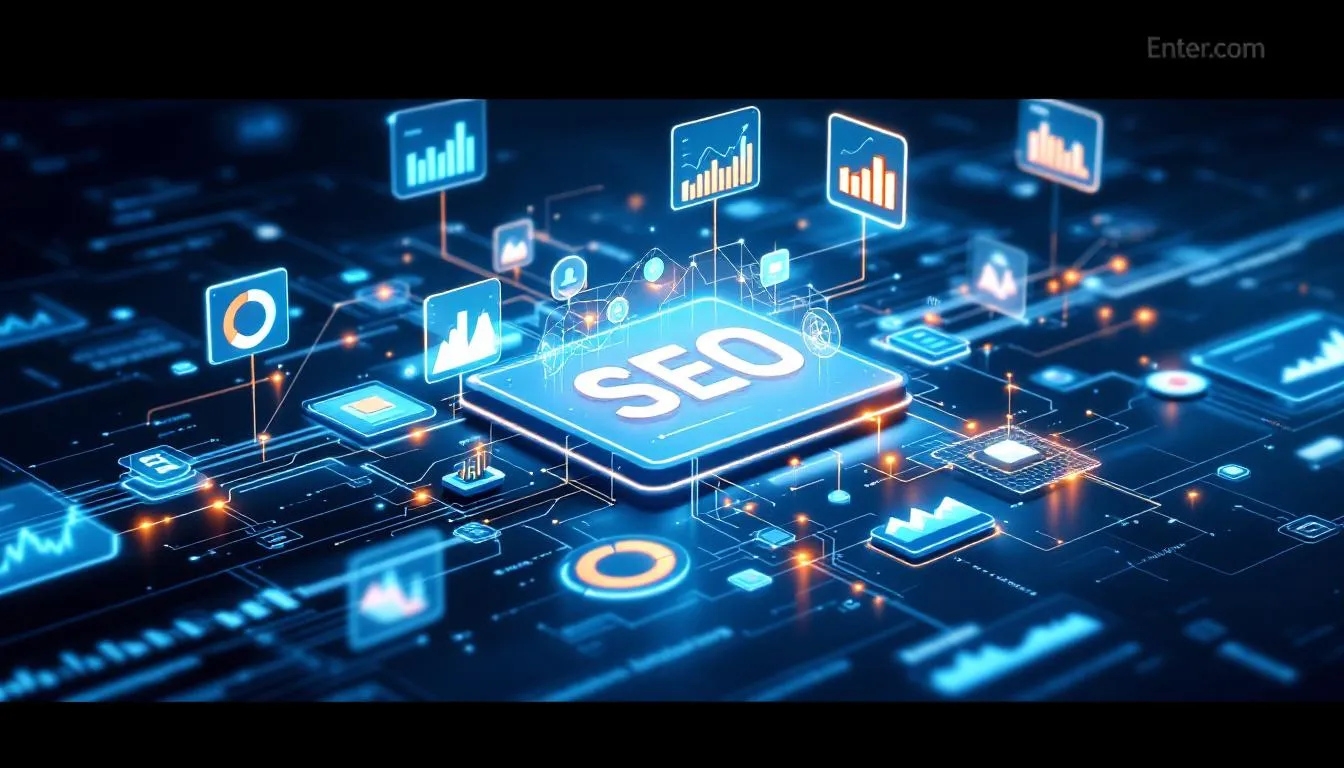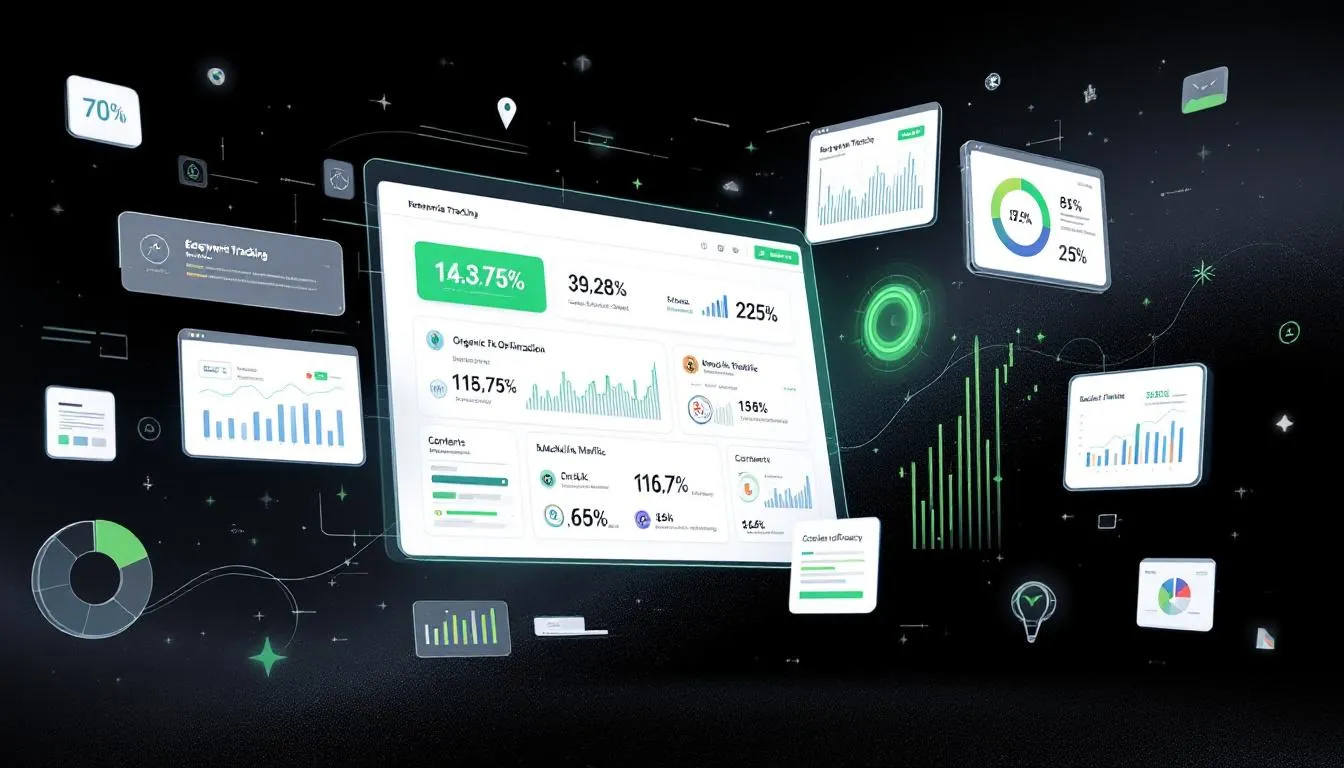Key Takeaways
- Enterprise SEO is designed for large-scale websites and requires strategies that address managing extensive content, broader audiences, and multiple stakeholders, unlike traditional SEO.
- Automation is crucial in enterprise SEO, enhancing workflow efficiency, allowing real-time adjustments, and enabling teams to focus on strategic initiatives amid extensive data management.
- A robust enterprise SEO strategy includes on-page and off-page optimization, technical SEO, and a well-defined content strategy, while successful implementation requires effective team collaboration and clear roles.
Understanding Enterprise SEO

Enterprise SEO is the practice of enhancing search engine optimization SEO for large-scale websites that cater to extensive audiences and contain numerous web pages. Unlike traditional SEO, which focuses on smaller, niche markets, enterprise SEO management addresses the complexity and scale of managing thousands to millions of web pages, requiring unique strategies and tools. Enterprise seos play a crucial role in this process.
Effective enterprise SEO strategies help enterprise organizations drive significant organic traffic, enhance brand awareness, and sustain growth through a successful enterprise seo strategy. This is essential for any enterprise organization looking to improve its online presence.
Key Differences Between Enterprise and Traditional SEO
Enterprise SEO involves:
- Targeting broader audiences and high-traffic keywords, often on a global scale.
- Managing extensive content, internal linking strategies, and large-scale keyword research to stay competitive.
- Navigating lengthy approval processes for SEO changes due to the involvement of multiple stakeholders.
Unlike traditional SEO, which might focus on local markets with simpler processes, enterprise SEO requires these additional complexities.
Enterprise SEO often requires collaboration and automation to manage the vast volume of data and tasks in project management. Enterprise businesses need to define their SEO goals before budgeting, contrasting with the straightforward budgeting in traditional SEO. This involves leveraging both short and long-tail keywords to enhance visibility and conversions.
The stakes are high, with significant impacts on growth goals and market reputation.
The Role of Automation in Enterprise SEO
Automation plays a pivotal role in enterprise SEO by streamlining workflows, identifying SEO issues, and ensuring quality control across various teams and locations. Automated tools can monitor backlinks, conduct comprehensive keyword research, and manage large volumes of title tags and meta descriptions efficiently. This not only enhances the efficiency of SEO tasks but also allows for real-time adjustments and continuous optimization, essential for maintaining competitive search engine rankings.
Automation enables organizations to manage their extensive digital footprints more effectively. Automation tools reduce manual workload and enable SEO teams to focus on strategic initiatives, from audits to consistent content updates. This approach is essential for managing the scale and complexity of enterprise-level SEO, driving better results and sustained growth.
Core Components of Enterprise SEO Strategy

Developing a robust enterprise SEO strategy involves comprehensive planning, execution, and ongoing monitoring. Key components include:
- On-page optimization
- Off-page optimization
- Technical SEO
- A well-defined content strategy
- Traditional seo strategies.
Each element enhances visibility, drives traffic, and maintains a competitive edge.
On-Page Optimization
On-page optimization is fundamental to enterprise SEO, focusing on elements like headers, meta titles, images, and body content. Effective on-page SEO involves integrating targeted relevant keywords within these elements to enhance relevance and search engine visibility. Analyzing competitors’ keyword portfolios can provide insights into traffic-driving terms that might be missing, helping to create a more comprehensive keyword strategy.
Optimizing the overall content structure, including headers and meta elements, ensures that search engines can easily crawl and index web pages. This improves user experience, boosts search engine rankings, and drives more organic traffic to the enterprise website.
Off-Page Optimization
Off-page optimization is equally crucial, focusing on building brand authority through quality backlinks and mentions from reputable sources. Digital PR strategies, such as creating high-quality original content that serves as a resource for journalists and bloggers, significantly aid link building. Leveraging unlinked brand mentions by reaching out to request links from sites that mentioned the brand can also enhance backlink profiles.
Off-page SEO builds credibility and authority, essential for achieving higher search engine rankings. Consistently creating valuable content and securing quality backlinks improves online visibility and attracts more organic traffic.
Technical SEO
Technical SEO ensures that enterprise websites are crawlable and indexable by search engines. It involves tasks like improving site architecture, speeding up loading times, and enhancing mobile-friendliness. Core Web Vitals, such as Largest Contentful Paint and Cumulative Layout Shift, are critical metrics that directly impact user experience and conversion rates.
Key elements for ecommerce sites include:
- Structured data like Schema Markup, which helps search engines understand and interpret large amounts of product data, enabling rich results.
- SSL certificates, which are vital for maintaining site security.
- Reduced image file sizes, important for maintaining site performance.
Content Strategy
A well-defined content strategy is essential for sustaining competitive visibility in enterprise SEO. Key components include:
- Regularly optimizing existing content
- Creating new, unique content tailored to target audiences
- Conducting thorough keyword analysis to identify gaps and opportunities These steps ensure that content aligns with search intent and drives organic traffic.
Scaling content production involves creating unique content for each product or category page, establishing topical authority, and driving conversions. Collaboration among departments and the use of AI for creating product descriptions can significantly enhance content production while maintaining brand consistency.
Advanced Tactics for Enterprise SEO Success

Advanced tactics are essential for taking enterprise SEO efforts to the next level. These include local SEO, international SEO considerations, and leveraging user-generated content to enhance search performance and reduce production costs.
Local SEO for Enterprises
Local SEO is crucial for enterprises with multiple locations as it maximizes visibility in local search results. Optimizing a business’s presence within specific geographical areas helps engage with localized customer searches. Tailoring website content and optimization strategies for different locations ensures that enterprises remain competitive in varied local markets.
Properly executed local SEO leads to increased visibility and customer engagement. Creating location-specific content, managing local business listings, and ensuring consistency across all online platforms is vital.
International SEO Considerations
International SEO is vital for enterprises operating across multiple international locations and languages. This involves:
- Optimizing websites to cater to local preferences and search behaviors
- Ensuring that content is relevant and accessible to diverse audiences
- Using hreflang tags to direct users to the appropriate language and regional versions of the site, enhancing user experience and search visibility.
Success in international SEO demands careful attention to technical implementation and content strategy to stay ahead of local competition. This ensures that enterprises can effectively reach and engage with their global customer base while maintaining a strong online presence.
Leveraging User-Generated Content
User-generated content (UGC) offers significant benefits for enterprise SEO by providing fresh content and social proof. This content type enhances search performance and conversion rates, particularly in the ecommerce sector. Utilizing customer-generated assets reduces content production costs while maintaining high-quality and relevant content.
Incorporating UGC into the content strategy boosts SEO and fosters customer engagement and trust. Encouraging customers to share reviews, testimonials, and other forms of content can create a continuous stream of valuable content that enhances the overall SEO strategy.
Overcoming Common Enterprise SEO Challenges

Large enterprises face unique challenges in SEO, from managing extensive websites to coordinating multiple websites and avoiding duplicate content. Addressing these challenges is crucial for maintaining effective SEO strategies and achieving sustained success.
Managing Large Websites
A centralized enterprise SEO strategy helps ensure consistent practices across complex website infrastructures. Managing SEO for large product inventories involves establishing streamlined processes, creating SEO-friendly page templates, and automating audits. Tools like Semrush’s Enterprise Crawler can identify underperforming content, supporting effective audits to keep content relevant and up to date.
Regular audits and automation of content creation, analysis, and optimization tasks are essential for managing extensive website content at scale. This ensures that all pages are optimized and perform well, contributing to overall site performance and user experience.
Avoiding Duplicate Content
Duplicate content can significantly harm SEO performance by diluting search engine rankings and causing indexing issues. To avoid duplicate content, enterprises should implement canonical tags, manage duplicate URLs, and customize meta tags. These strategies help ensure that content remains unique across various pages, maintaining search visibility and relevance.
Ecommerce sites, in particular, must be vigilant about duplicate content due to automatically generated product or category pages. Ensuring unique content for each product description and category page is critical for avoiding duplicate content issues.
Coordinating Multiple Teams
Effective coordination and communication across departments are vital for successful enterprise SEO. Developing a culture of SEO awareness among different teams reduces delays in SEO implementations. These teams include:
- Content
- Development
- Design
- Marketing
- IT
- External agencies
Tools like Semrush Enterprise’s Collaboration Toolkit can streamline collaboration and improve workflow management.
Aligning workflows and maintaining clear communication are crucial for working effectively with remote teams and ensuring consistent SEO practices. This fosters a collaborative environment where SEO initiatives can be executed efficiently and effectively.
Measuring and Reporting SEO Performance
Regular monitoring and reporting are essential for evaluating the effectiveness of enterprise SEO efforts. Tracking key performance metrics, analyzing data, and making informed adjustments to strategies is essential.
Tools like Google Search Console and other enterprise SEO solutions and an seo tool facilitate this process.
Essential Metrics for Enterprise SEO
Key performance indicators (KPIs) such as conversion rates, search engine rankings, and organic search traffic are vital for measuring the success of SEO strategies:
- Conversion rates reflect the quality of organic traffic and its ability to generate leads or sales.
- Search engine rankings indicate the website’s position for target keywords, including keyword rankings.
- Organic traffic measures the number of website visitors coming to the website through unpaid search results, contributing to overall website traffic.
Monitoring these metrics offers insights into the effectiveness of SEO efforts and informs future strategies. Regular KPI analysis ensures enterprises can adapt to changes and continuously optimize their SEO performance.
Using SEO Tools for Data Analysis
Using the right SEO tools is crucial for managing and analyzing large-scale seo data. Tools like:
- Google PageSpeed Insights
- Botify
- SEMrush are essential for optimizing web pages and ensuring effective data collection. These tools provide valuable insights into:
- page speed
- user behavior
- traffic sources which are critical for measuring overall SEO success with Google Analytics.
For local SEO, utilizing Google Business Profiles along with other local SEO resources can enhance visibility and aid in data analysis. This comprehensive approach ensures that enterprises can effectively manage their SEO efforts and make data-driven decisions.
Reporting Best Practices
Effective SEO reporting should:
- Deliver insights regularly through monthly or quarterly reviews
- Highlight performance trends
- Inform strategic decisions
- Include clear and comprehensive reports with key metrics, analysis, and actionable recommendations.
Regular reporting allows enterprises to track progress, identify areas for improvement, and adjust strategies to align with changing market conditions and business goals.
Choosing the Right Enterprise SEO Platform

Choosing the right enterprise SEO platform is crucial for managing and optimizing the online presence of large organizations through an enterprise site and enterprise sites. These enterprise seo platforms provide comprehensive tools and features designed to handle the scale and complexity of enterprise SEO efforts, including enterprise seo tools.
Key factors to consider include the platform’s features, scalability, integration capabilities, and pricing. The right platform can enhance SEO performance and achieve sustained success.
Evaluating Features and Capabilities
An effective enterprise SEO platform should include comprehensive features such as keyword research, content optimization, competitor tracking, and backlink monitoring. High-quality platforms often include advanced features like AI-powered research and predictive analytics to enhance SEO effectiveness. Collaboration and workflow management tools are essential for streamlining communication and task execution across teams.
Key practices for effective communication and content optimization include:
- Regular updates for effective communication.
- Transparent reporting that includes metrics and outcomes.
- Advanced technical SEO analysis.
- Extensive A/B testing capabilities for optimizing content in large-scale environments.
Evaluating an SEO platform’s functionality and scalability is important to ensure optimal investment.
Assessing Scalability and Integration
Scalability is crucial for an enterprise SEO platform to handle increasing tasks and manage the complexity of large websites. A scalable platform should manage a large volume of URLs without compromising performance, even as the digital footprint grows. This ensures the platform can support the enterprise’s growth and evolving SEO needs.
Integration capabilities are equally important for a platform to seamlessly integrate with existing business processes and tools. This includes automated resource scaling and modular upgrades to accommodate growing data and complexity. A scalable and integrative SEO platform helps enterprises maintain efficiency and effectiveness in their SEO efforts as they expand.
Cost vs. Value
The total cost of ownership for an enterprise SEO platform includes licensing fees, implementation, training, and ongoing support expenses. Before selecting an SEO solution, it is essential to list all the tools you plan to keep and ensure the platform can integrate with them.
Balancing the cost and value of an SEO platform requires evaluating its features, scalability, and integration capabilities to ensure it meets enterprise needs and provides a return on investment.
Building a Skilled Enterprise SEO Team
A skilled enterprise SEO team is essential for managing and executing SEO strategies effectively. This team should include roles such as SEO leadership, technical SEO, and content SEO, each responsible for specific aspects of the SEO efforts. Enterprise seo teams play a crucial role in ensuring these strategies are implemented successfully.
By fostering collaboration and continuous education, enterprises can ensure their SEO team stays updated with SEO industry trends and technologies.
Roles and Responsibilities
SEO roles and their focuses include:
- SEO leadership: Oversees overall strategy and aligns SEO initiatives with business goals.
- Technical SEO roles: Focus on website indexing, crawlability, and resolving technical issues affecting search performance.
- Content SEO roles: Involve keyword research, content optimization, and collaboration with content creators to ensure adherence to SEO strategies.
Clear roles within an enterprise SEO team are crucial for aligning efforts with broader business objectives. This structure enables the team to work efficiently and effectively, driving better results and sustained growth.
Training and Development
Continuous education in SEO best practices keeps team members updated on the latest industry trends and technologies. Investing in training and development ensures the team remains proficient in implementing SEO strategies and adapting to changes in search engine algorithms.
Good Solutions, with their expertise in SEO, can provide tailored training programs to help enterprises achieve their SEO company goals (www.goodsolutions.tech).
Collaboration Across Departments
Effective collaboration across departments maintains a logical site structure that enhances user experience and SEO performance. Implementing a unified design model for every branch and remote location ensures consistent user experience and brand identity. Clear communication and collaboration among in-house marketing teams are necessary for successful SEO initiatives.
Fostering a culture of SEO awareness and aligning workflows ensures departments work together towards common SEO goals. This collaborative approach enhances the overall effectiveness of the SEO strategy and drives better results.
Summary
Mastering enterprise SEO in 2025 requires a comprehensive approach that includes understanding its unique challenges, implementing advanced tactics, and building a skilled team. By focusing on on-page and off-page optimization, technical SEO, and a robust content strategy, enterprises can enhance their search visibility and drive significant organic traffic. Regular monitoring and reporting, along with the right SEO platform and continuous team development, are essential for sustained success. With these strategies in place, enterprises can navigate the complexities of SEO and achieve their growth goals.
Frequently Asked Questions
What is the main difference between enterprise SEO and traditional SEO?
The main difference between enterprise SEO and traditional SEO lies in enterprise SEO’s focus on broader audiences and high-traffic keywords, necessitating customized strategies and longer approval processes due to multiple stakeholders’ involvement.
How does automation benefit enterprise SEO?
Automation significantly enhances enterprise SEO by streamlining workflows and identifying issues, thereby improving efficiency in large-scale SEO management and enabling real-time adjustments for continuous optimization.
What are the key components of a successful enterprise SEO strategy?
A successful enterprise SEO strategy hinges on on-page optimization, off-page optimization, technical SEO, and a robust content strategy, as each element significantly enhances visibility and drives traffic. Prioritizing these components is essential for achieving optimal results.
Why is local SEO important for enterprises with multiple locations?
Local SEO is crucial for enterprises with multiple locations as it enhances visibility in local search results, facilitating effective customer engagement in specific geographic areas and maintaining competitiveness in diverse local markets.
What metrics are essential for measuring enterprise SEO performance?
To effectively measure enterprise SEO performance, it is crucial to focus on conversion rates, search engine rankings, and organic traffic. These metrics offer valuable insights that can guide future optimization strategies.
#EnterpriseSEO #SEO2025 #LargeScaleSEO #SEOAutomation #OnPageSEO #OffPageSEO #TechnicalSEO #ContentStrategy #LocalSEO #InternationalSEO #UserGeneratedContent #SEOChallenges #WebsiteManagement #DuplicateContent #SEOTeam #SEOMetrics #SEOReporting #SEOTools #ScalableSEO #AdvancedSEO
